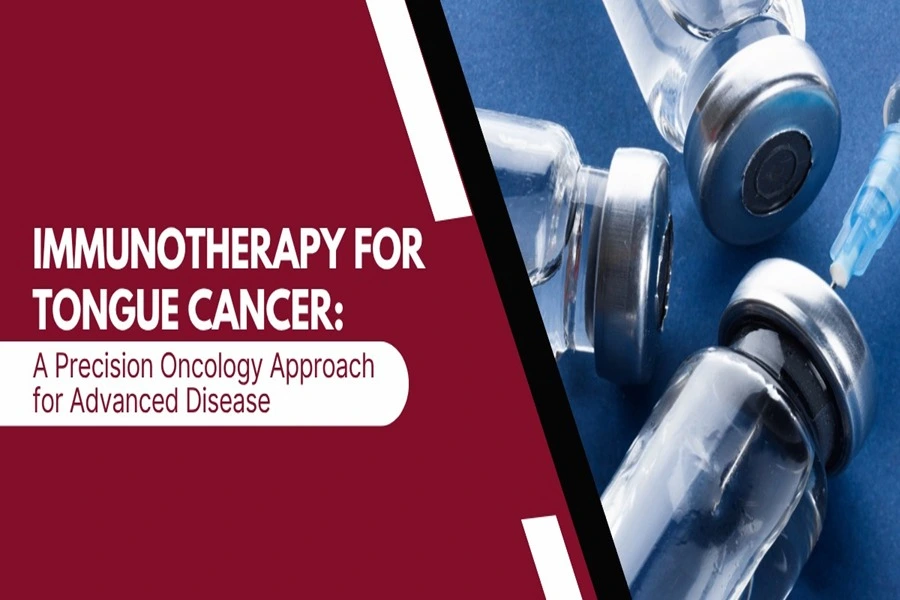Tongue cancer, a subset of oral cancers, presents significant challenges for patients, particularly in Stage 4 disease, where the cancer has often spread (metastatic) or recurred following traditional treatments. For these advanced cases, immunotherapy—a hallmark of precision oncology—offers a groundbreaking and personalized approach to treatment by harnessing the body’s immune system to fight cancer.
In this article, we’ll explore how immunotherapy is used as part of a precision oncology strategy for tongue cancer, focusing on its mechanisms, applications in advanced stages, and its potential to transform patient outcomes.
What is Immunotherapy?
Immunotherapy is a form of cancer treatment that works by stimulating the immune system to recognize and attack cancer cells. While traditional treatments like chemotherapy and radiation target cancer cells directly, immunotherapy focuses on enhancing the body’s natural defense mechanisms. This approach is particularly valuable in precision oncology, where treatments are tailored to an individual’s unique cancer profile through biomarkers.
When is Immunotherapy Used for Tongue Cancer?
Immunotherapy is most commonly used in Stage 4 tongue cancer, especially in the following scenarios:
3. Combination with Traditional Therapies:
Immunotherapy is also being studied in combination with surgery, chemotherapy, and radiation for locally advanced tongue cancer. These combinations aim to improve outcomes by creating a synergistic effect, where the immune system is better equipped to eliminate residual cancer cells.
4. Personalized Treatment Based on Biomarkers:
Precision oncology leverages biomarkers such as tumor mutational burden (TMB) and microsatellite instability (MSI) to identify patients most likely to benefit from immunotherapy. This personalized approach ensures that the right treatment is delivered to the right patient at the right time.
How Does Immunotherapy Work?
The most widely used immunotherapy for tongue cancer involves immune checkpoint inhibitors (ICIs). These therapies work by targeting specific proteins that tumors use to evade the immune system. Key mechanisms include:
- PD-1/PD-L1 Inhibitors: Drugs like pembrolizumab and nivolumab block the interaction between PD-1 (on immune cells) and PD-L1 (on tumor cells), reactivating the immune system to attack cancer cells.
- CTLA-4 Inhibitors: These drugs enhance the activation of T cells, further boosting the immune response.
- Combination Approaches: By integrating ICIs with traditional therapies or emerging treatments like cancer vaccines or oncolytic viruses, researchers aim to increase the effectiveness of immunotherapy.
Precision Oncology: Tailoring Treatments for Advanced Tongue Cancer
Precision oncology is revolutionizing cancer care by leveraging biomarkers to guide treatment decisions. In the context of tongue cancer, this approach involves:
- PD-L1 Testing: Patients with high PD-L1 expression are more likely to benefit from ICIs like pembrolizumab.
- Tumor Mutational Burden (TMB): High TMB increases the likelihood of immunotherapy success by creating more neoantigens for the immune system to recognize.
- Microsatellite Instability (MSI): MSI-high tumors are another biomarker associated with better responses to ICIs.
By integrating these biomarkers into treatment protocols, precision oncology ensures that immunotherapy is targeted and effective for patients with advanced tongue cancer.
Benefits and Challenges of Immunotherapy
Immunotherapy offers significant advantages, particularly for patients with advanced or Stage 4 disease:
- Durable Responses: Some patients experience long-term remission, even after other treatments have failed.
- Fewer Side Effects: Unlike chemotherapy and radiation, immunotherapy generally spares healthy tissues, reducing side effects.
- Personalized Approach: Precision oncology enables treatments to be tailored to each patient’s unique cancer profile, improving outcomes.
Challenges:
- Limited Response in Some Patients: Not all patients respond to immunotherapy, highlighting the need for better biomarkers to predict success.
- Immune-Related Side Effects: Overactivation of the immune system can lead to inflammation in organs like the lungs or liver, though these side effects are often manageable.
- Cost and Accessibility: Immunotherapy can be expensive, limiting access for some patients.
Immunotherapy in Stage 4 Tongue Cancer: A Transformative Option
For patients with Stage 4 tongue cancer, immunotherapy represents a transformative treatment option. By targeting the immune system rather than the cancer directly, it offers a new way to control the disease, even in cases where traditional treatments have failed. Clinical trials have demonstrated improved survival rates and better quality of life for patients treated with ICIs like nivolumab and pembrolizumab.
Looking Ahead: The Future of Precision Oncology and Immunotherapy
The future of immunotherapy in tongue cancer lies in its integration with precision oncology. Researchers are working to:
- Develop New Biomarkers: Identifying additional biomarkers will help predict which patients are most likely to respond to immunotherapy.
- Optimize Combination Therapies: Combining immunotherapy with surgery, radiation, or other treatments could further improve outcomes.
- Reduce Costs and Expand Access: Efforts are underway to make immunotherapy more affordable and accessible to patients worldwide.
Conclusion
Immunotherapy, as part of a precision oncology approach, is revolutionizing the treatment of tongue cancer, particularly in Stage 4 disease. By tailoring treatments based on biomarkers and leveraging the body’s immune system, this innovative therapy offers new hope for patients with advanced cancer. While challenges remain, ongoing research and clinical advancements are paving the way for more effective, personalized, and accessible treatments. For patients and their families, immunotherapy is a beacon of hope in the fight against tongue cancer.

